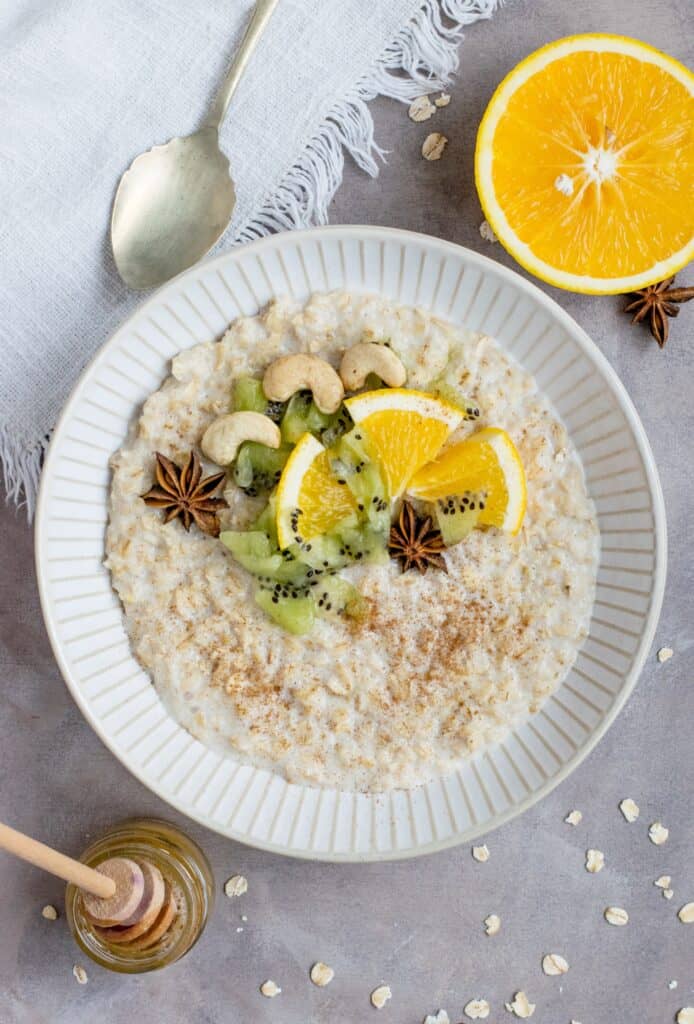Weight loss benefits of oatmeal
Oatmeal has many health benefits. It is a great breakfast choice because it provides a high amount of nutrients and energy. Not only does oatmeal taste great, but it’s also a healthy meal. It’s high in fiber and protein, low in fat, and contains lots of vitamins and minerals. Oatmeal is also a great source of energy. It helps keep you fuller longer, which means you’ll likely feel less hungry throughout the day. And because it fills you up, you’re less likely to overeat later.
Fiber is found in oatmeal and other foods like beans, fruits, vegetables, nuts, seeds, and whole grains. Soluble fiber binds water and creates a gel-like substance that slows down digestion and helps your body feel full longer.
Oats help to keep blood sugar levels steady because they contain soluble fiber, which slows digestion and absorption of carbohydrates. Which helps your body feel full longer, boosts your immune system and reduces inflammation.
Oatmeal contains a unique group of antioxidants called avenanthramides, which are almost solely found in oats. Both old and newer research has found that avenanthramides may help lower blood pressure levels by increasing the production of nitric oxide. This gas molecule helps dilate (widen) blood vessels and leads to better blood flow
Eating oats can help you lose weight, per Harvard University. Oats contain beta-glucans, which bind to cholesterol-rich particles in your body and move those particles through your digestive tract until they’re eliminated. Weight loss can also lower high cholesterol, per Johns Hopkins Medicine. Oatmeal’s ability to regulate hunger can help you keep track of your eating habits and cut back when you need to.
Beta-Glucans
Beta-Glucans are polysaccharides found in oats and other grains, including barley, wheat, rye, and corn. These compounds are considered prebiotics because they feed beneficial bacteria in the intestines. Beta-glucans have been shown to increase the release of the satiety hormone peptide YY (also called PYY) in the small intestine. This hormone helps you feel fuller longer, and reduces appetite. Oats seem to be particularly effective at promoting satiety. One study showed that oat beta-glucans increased the levels of PYY in healthy adults after just two weeks of consumption. Another study found that subjects who ate oatmeal had lower blood sugar levels than those who did not eat oatmeal.
Constipation affects nearly 16 out 100 adults and about 33 percent of those aged 60 and over. Oats contain soluble dietary fibers that may help ease symptoms of constipation. Some studies suggest that oat bran may also help alleviate constipation in older adults.
A study published in the Journal of Nutrition showed that eating oat bran could help prevent constipation in older adults. A total of 31 older adults ate either a low-fat milk drink or a high-fiber cereal bar every day for 12 weeks. After three months, researchers found that participants who had eaten oat bran reported fewer bowel movements than the control group. Additionally, 59 percent of those people stopped taking laxatives after the study, compared to an increase of 8 percent among the control group.
Oats contain beta glucans, which are polysaccharides that help regulate blood sugar levels. Oat bran contains soluble fibers, including beta glucans, which can help reduce cholesterol levels. Beta glucans are also thought to help prevent cancer because they bind to bacteria and viruses, making them unable to attach to cells.
A study shows that oatmeal helps prevent constipation in older adults. Oats contain soluble fiber, which slows down digestion and absorption of nutrients, helping you feel full longer.
Things to watch for
Pay attention when eating carbs: Oats contain a lot of carbohydrates, which means you need to watch out if you’re trying to lose weight. One cup of dry oats contains about 100 calories and 6 grams of carbs. If you’re watching your daily calorie intake, then 1/2 cup of oats won’t cause any problems. But if you’re aiming for a lower number, like 500 calories per day, then you’ll want to stick to less than 1/4 cup of oats.
Instant oatmeal is often high in added grams of sugars and grams of fats and low in fiber. If you’re looking for a quick breakfast option, opt instead for steel cut oats, which are made from rolled oats that are then cut into smaller pieces before cooking. Steel cut oats have a lower GI value because they contain more fiber than instant oats. You can add your own flavorings to them, like cinnamon or vanilla extract. To keep things simple, try adding ground flax seeds to your oatmeal. Flaxseed contains omega 3 fatty acids, which help reduce inflammation and may even help prevent cancer.
Fiber helps keep you regular, but too much can cause gas and other gastrointestinal issues. Start with small amounts of fiber—two to four servings per day—and gradually work your way up to eight servings a day. You might also try adding a few tablespoons of ground flaxseed to your morning smoothie or yogurt. Flaxseeds contain omega-3 fatty acids, which can help lower cholesterol levels and prevent heart disease.
Oats are a grain and have lots of energy in a small package. This means it’s very easy to overeat. Many people need to add honey or sugar to make it palatable, which doesn’t help.
Is oatmeal good for weight loss?
Instant oatmeal is made from rolled oats that are cooked until soft and then dried. Instant oatmeal comes in different flavors, including chocolate chip, cinnamon roll, apple pie, and banana nut bread. There are also varieties that contain honey, brown sugar, or molasses. Oats are high in fiber and low in fat. They’re also gluten-free. But you should still read labels carefully before buying any type of oatmeal because there are other additives in them.
Cordain says that oatmeal’s effectiveness at helping with weight loss really depends upon what you put it with. “You want to make sure that you incorporate some grams of protein and fats,” she says. That could mean having it with milk, adding some seed or nut butter, eating it with an egg, or tossing some fruit or vegetables into your bowl. You can also add a handful of berries or shreds of zucchini for extra nutrition.
Is Oatmeal Good For Weight Loss?
When you’re trying to lose fat, eating a large meal at lunchtime isn’t going to help. You need to start your day with an energy boost, and there’s nothing like a healthy breakfast to get you started. A study published in Obesity found that eating breakfast helps you lose weight, even if you eat the same amount of calories throughout the day. So instead of grabbing a sugary cereal bar, try a bowl of oatmeal. Not only will it fill you up, but it’ll also give you a quick burst of energy to keep you going all morning long.
Oats are high in fiber, which helps keep you full longer and reduces the amount of calories you consume. Oats also contain protein, iron, calcium, magnesium, phosphorus, zinc, copper, manganese, selenium, vitamin B6, folate, niacin, pantothenic acid, riboflavin, thiamine, biotin, choline, lysine, tryptophan, and potassium. These nutrients help boost your immune system, reduce inflammation, and maintain bone health.
There are many different types of oats out there. Some are rolled and cooked like regular old oats, while others are milled and then dried before cooking. There are also steel cut oats, quick oats, instant oats, and even gluten free oats! Oats are an excellent source of fiber, protein, iron, magnesium, zinc, vitamin B6 and potassium. However, if you’re looking for something to help you lose weight, you may want to avoid the sugary varieties. That said, if you’re looking to get your daily dose of soluble fiber, oats are a great option.
Oatmeal Gives You Energy
Exercise is an important part of losing weight. Oatmeal is a great snack because it provides a steady stream of energy throughout the day. Fat will not slow you down or upset your stomach like high-fat foods might. Eat Plain oatmeal as part of a healthy diet.
Just make certain you eat it an hour or so before your workout and avoid including high-fat ingredients like whole milk or even butter.



